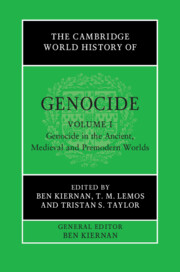Book contents
- The Cambridge World History of Genocide
- The Cambridge World History of Genocide
- The Cambridge World History of Genocide
- Copyright page
- Contents
- Figures
- Maps
- Tables
- Contributors to Volume I
- General Editor’s Acknowledgements
- General Editor’s Introduction to the Series
- Introduction to Volume I
- Part I Themes of Genocide through History
- Part II The Ancient World
- Part III The Medieval World and Early Imperial Expansions
- 15 William the Conqueror’s Harrying of the North, 1069–1070
- 16 Genocidal Massacres of Jews in Medieval Western Europe, 1096–1392
- 17 Crusaders and Mass Killing at Jerusalem in 1099
- 18 The Albigensian Crusade and the Early Inquisitions into Heretical Depravity, 1208–1246
- 19 Mongol Genocides of the Thirteenth Century
- 20 Việt Nam and the Genocide of Champa, 1470–1509
- 21 Genocidal Massacres in Medieval India
- 22 Mass Extermination in Prehistoric Andean South America
- 23 The Spanish Destruction of the Canary Islands
- 24 Genocidal Massacres in the Spanish Conquest of the Americas
- Index
21 - Genocidal Massacres in Medieval India
from Part III - The Medieval World and Early Imperial Expansions
Published online by Cambridge University Press: 23 June 2023
- The Cambridge World History of Genocide
- The Cambridge World History of Genocide
- The Cambridge World History of Genocide
- Copyright page
- Contents
- Figures
- Maps
- Tables
- Contributors to Volume I
- General Editor’s Acknowledgements
- General Editor’s Introduction to the Series
- Introduction to Volume I
- Part I Themes of Genocide through History
- Part II The Ancient World
- Part III The Medieval World and Early Imperial Expansions
- 15 William the Conqueror’s Harrying of the North, 1069–1070
- 16 Genocidal Massacres of Jews in Medieval Western Europe, 1096–1392
- 17 Crusaders and Mass Killing at Jerusalem in 1099
- 18 The Albigensian Crusade and the Early Inquisitions into Heretical Depravity, 1208–1246
- 19 Mongol Genocides of the Thirteenth Century
- 20 Việt Nam and the Genocide of Champa, 1470–1509
- 21 Genocidal Massacres in Medieval India
- 22 Mass Extermination in Prehistoric Andean South America
- 23 The Spanish Destruction of the Canary Islands
- 24 Genocidal Massacres in the Spanish Conquest of the Americas
- Index
Summary
This chapter looks at specific evidence of political violence and massacres during the medieval Delhi Sultanate (1206-1526), for most of which period roughly the whole of the Indian Subcontinent was ruled from Delhi by powerful Sultans with Turkish antecedents and exposure to Persianate political culture of Central Asia and Iran. In view of the abundant material in contemporary sources, the focus is on genocidal massacres under three most despotic rulers who brooked no criticism, resistance or protest against their rule, which tended to be arbitrary and in complete disregard of existing conventions of politics and governance. They were Sultan Ghiyas-ud-Din Balban (ruled 1266-86), Sultan Ala-ud-Din Khalji (ruled 1296-1316), and Sultan Muhammad bin Tughluq (ruled 1325-51). Historian Ziya-ud-Din Barani’s mid-14th century discussion of their reigns show not only that opponents resisting their conquests or regimes were brutally killed in large numbers during armed combat, but also that many of those captured alive were later massacred in cold blood. The women and children of soldiers from the other camp were not only imprisoned and enslaved, but also bodily harmed, often killed; women were also raped as punishment for alleged crimes of their male relatives.
Keywords
- Type
- Chapter
- Information
- The Cambridge World History of Genocide , pp. 547 - 571Publisher: Cambridge University PressPrint publication year: 2023



